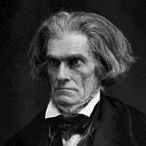 John C. Calhoun graduated from Yale University in 1804. He went on to become vice president of the United States, serving under both John Quincy Adams and Andrew Jackson. A native of South Carolina, Calhoun was a major defender of the institution of slavery.
John C. Calhoun graduated from Yale University in 1804. He went on to become vice president of the United States, serving under both John Quincy Adams and Andrew Jackson. A native of South Carolina, Calhoun was a major defender of the institution of slavery.
A residential college at Yale was named in Calhoun’s honor in 1932. Since that time a portrait of Calhoun has hung over the fireplace in the dining room of the residential college. Two other portraits of Calhoun were placed in the living quarters of the master of the college.
Now all three portraits have been taken down and the university is considering whether the name of Calhoun College should be maintained. The decision to remove the portraits was made by Julia Adams, master of Calhoun College and a professor of sociology at Yale. Adams also stated that a ceremonial mace that was once owned by Calhoun will no longer be used during ceremonial occasions at the college.










